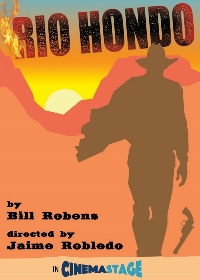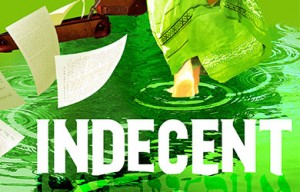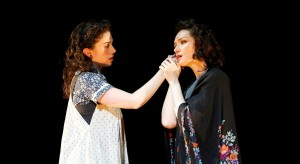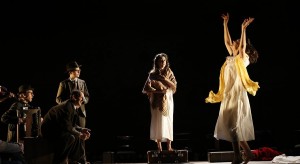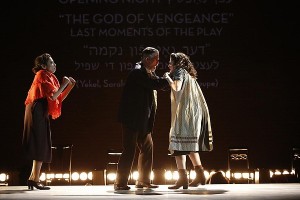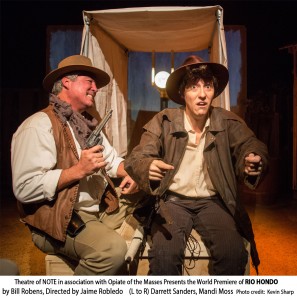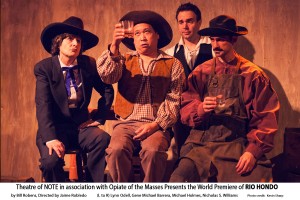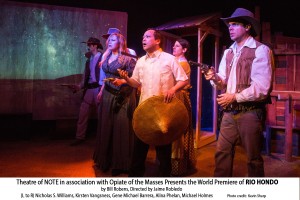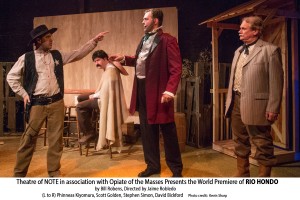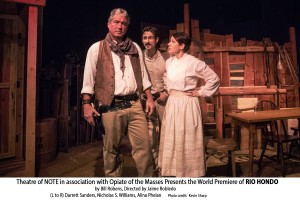SHOWS THAT TELL, SHOWS THAT SHOW
A list of the most popular investigative themes for artistic works in 2015 would certainly include (1) art itself, particularly within the same medium, and (2) the relevance of identity politics to (1). With Indecent, which opened last week at the La Jolla Playhouse in a joint production with Yale Rep, Paula Vogel and Rebecca Taichman describe a short arc of political solipsism, deciding rather academically that art is good for people. With Rio Hondo, which just opened at Hollywood’s Theatre of NOTE, Bill Robens and Jaime Robledo essay related sociological and literary questions with more success, largely because their show aspires to entertain and interest.
Taichman’s 2000 thesis project at Yale was a play called The People vs.“The God of Vengeance,” developed in conjunction with several others including student dramaturg Rebecca Rugg. In the tradition of thirty years’ textual deconstruction by The Wooster Group et al, Taichman’s play looked at another play, Sholem Asch’s 1906 God of Vengeance, through the lens of its 1923 obscenity trial in New York. The original Yiddish melodrama about lesbianism and family loyalty in a Jewish-owned Warsaw brothel toured the world for almost 20 years before (of course) Americans got uptight about it. Now Vogel and Taichman have expanded, not to say enlarged, on the subject.
Indecent is a literal travelogue: Projected supertitles (ST PETERSBERG, 1907) and lightly-sketched vignettes mark the geographic progress of God of Vengeance from Poland to Russia and the major points in western Europe. We are told repeatedly of the importance of the work. We are told of its impact, of its hostile and enthusiastic receptions. We are told that real people wrote, produced, stage-managed and acted the thing. We are assured that these two-dimensional-seeming people were earnest, extraordinary, some of them gay. We are told about the play’s role in the evolution of Jewish consciousness and the history of Yiddish theater, that it was performed illegally in the ghettos of World War II, that its author’s heroic iconoclasm brought him to the attention of the House Un-American Activities Committee.
Throughout, Vogel uses description and pronouncement to substitute for organic revelation, as if to dare her audience not to engage in profound reflection. But the matzo-thin world she creates is at once expositional and untrustworthy. In this show’s 1923 New York City, a lesbian kiss on stage will get you declaimed from synagogues and thrown in jail, while the open practice of lesbianism on the sidewalk attracts no attention or comment. Vogel tantalizes with the promise of what her characters call Vengeance’s most poignant and poetic scene, but when we finally see it staged, a rain gag is the star, not the excellent actresses nor the snippet of text.
A developed character or two, a unifying narrative exposited through obstacle and event and specific moment – a story as well as a plot – would help this show feel less like an obligatory Haggadah at your boyfriend’s parents’ Seder. It has not got those characters or that narrative. It has instead a committed and talented cast doing its best to make these elements into a play.
Director Taichman employs few theatrical devices in this straight-ahead vision – mostly people describe what’s happened or going to happen. There’s a physical manifestation of the symbolic dust and ash common to Western religious tradition and modern Jewish persecution, as literal as can be and limited in effect. Another device is vastly more persuasive: as Michael Alpert did with The People vs. “The God of Vengeance,” Lisa Gutkin and musical director Aaron Halva compose new and traditional songs and motifs. Along with Travis W. Hendrix they also perform, creating an appropriately broad musical soundscape that does more to unify the piece than any other single element. The strolling, dancing live musicians are the part of the show that best conveys a sense of place and time and immediate relevance to the condition of life on earth.
Rio Hondo, for its part, deconstructs the traditions and tropes of movie westerns with all the rigors of diligent scholarship and none of the pomposity. Author Robens’ tools are fascination and delight, and he has in Robledo the great fortune of a perfectly attuned presenter.
The artists use as an opening moment a scene quoted with loving cheek from Sergio Leone’s Once Upon a Time in the West, allowing the interminable stylization of the source material to inform and preface a wholly new and entirely familiar universe. Later, when two studly actors reprise and elaborate on the “Can I see your gun?” sequence from Red River, the eroticism of the Borden Chase and Howard Hawks original is not mocked or abused but employed as a method of exploration. It’s probably no accident that a half-Irish, half-Japanese guy plays a character named Sanchez, nor that other mixed-race actors are cast against type. Neither does this come across as an element of manifesto. It’s just a very good and often hilarious show that uses the right people in the right parts.
A tired gunfighter comes to town looking for peaceful closure. Instead he is immediately embroiled in a real estate battle against railroad interests and the corrupt local sheriff. The dialogue is witty and mostly free of self-reference. When the show does acknowledge itself as parody or homage, the gestures work because they happen within the flow of an ongoing circumstance fraught with stakes and peril. Everybody carries a realistic-looking revolver, drinks whiskey-looking whiskey, and rides a sawhorse. The large cast’s nuanced performances are made possible by the writer and director’s attention to detail. The value and resonance of this cliched popular form could not be conveyed half so well without the explicit specifics of this story, these people.
It is too bad that Indecent boasts actors as rich as Katrina Lenk and Richard Topol and Tom Nelis and gives them so little to do that in two hours none has a moment to match a half-dozen of Darrett Sanders’ in Rio Hondo. Sanders plays John Wayne without playing John Wayne, but then he uses the small stages of Los Angeles as a gallery in which to hang several discrete characters every year, and I never see him coming. Grace Eboigbe channels Katy Jurado and Grace Kelly at the same time, and is funnier than either. This show is in fact so much fun that you might not notice how much it has to say, in a textual-analytical sort of way, about our collective desires, our shared concerns. A good comedy tells me why I want what I want as much as it tells me that I want it. It just doesn’t make me repeat it back fifty times on the blackboard.
When Robledo stages live action in front of Ben Rock’s vivid projections of old western footage, when he manages to drag an actor under a speeding stagecoach in a black box theater the size of the Starrett cabin from Shane, he makes his points implicitly, by making the scene play. When the director uses Matt Richter’s lights and transportive sound design, he’s showing us, not telling. Pete Hickok’s crammed, handsome set, Kimberly Freed’s on-target costumes are on stage to do one job only, and it’s the right one. The reverence this team does not show is evidenced in the good time you have watching their work. The audience is not dragged by the ear as the playwright literally writes upon the wall. Instead we are engaged in the traditional manner: Robens tells us a story, and we like it.
Indecent
Yale Rep at the La Jolla Playhouse
Mandell Weiss Theatre, 2910 La Jolla Village Dr, La Jolla, CA‎
ends on December 10, 2015
for tickets, call 858.550.1010 or visit La Jolla Playhouse
photos by Carol Rosegg
Rio Hondo
Theatre of NOTE
in association with Opiate of the Masses
1517 N Cahuenga Blvd. in Hollywood
ends on December 20, 2015
EXTENDED to January 10, 2015
for tickets, call 323-856-8611 or visit Theatre of NOTE
photos by Kevin Sharp
